20 Mind-Blowing Facts About WCW
4. WCW Didn't Turn A Profit Until 1995

Ted Turner was aware that WCW was a bit of a money pit, but the media institution argued to his various shareholders and investors that pro wrestling had been there for his network in the darkest of hours, and he'd therefore stand by it whatever the cost. WCW didn't make a lot of money, and it's crazy to think that the promotion wouldn't turn a profit until 1995.
A lot of this is attributed to the advent of Monday Nitro, but Eric Bischoff's decision to cut down on the amount of days the company spent on the road, instead filming the bulk of programming from the MGM Studios in Florida, saved the company a hell of a lot of money. Sure, the shows weren't much to write home about, and the block tapings did cause a few creative headaches (wrestlers losing titles before they'd even won them on live events, for example), but money was there to be saved.
By doing so, Bischoff gained a lot of admirers and confidence grew from Turner that he was the man to lead WCW on to bigger and better things. That's likely why Ted agreed to finance a prime time Monday evening show which would go head-to-head with the WWF's Monday Night Raw.